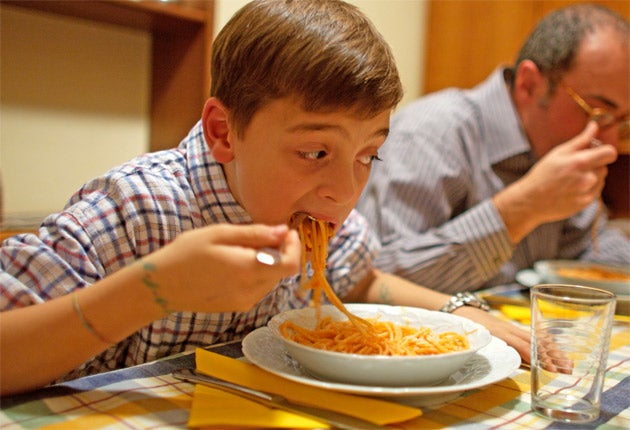Child obesity swells as Italy forgets eating habits

Your support helps us to tell the story
From reproductive rights to climate change to Big Tech, The Independent is on the ground when the story is developing. Whether it's investigating the financials of Elon Musk's pro-Trump PAC or producing our latest documentary, 'The A Word', which shines a light on the American women fighting for reproductive rights, we know how important it is to parse out the facts from the messaging.
At such a critical moment in US history, we need reporters on the ground. Your donation allows us to keep sending journalists to speak to both sides of the story.
The Independent is trusted by Americans across the entire political spectrum. And unlike many other quality news outlets, we choose not to lock Americans out of our reporting and analysis with paywalls. We believe quality journalism should be available to everyone, paid for by those who can afford it.
Your support makes all the difference.Italy is famed for its healthy Mediterranean diet, but alarming new figures show that it has a higher proportion of overweight children than anywhere in Europe.
While the rest of the world is encouraged to copy the traditional Italian menu by swapping junk food for fruit and vegetables, it seems Italians are forgetting the lessons they taught everyone else.
Traditional home-made meals and snacks are losing out to low-cost, calorie-packed fast food. Coupled with less physical activity, the results are evident with ever more "ciccioni" – fat children – on every street corner.
Dr Antonello del Vecchio, a practising doctor and spokesman for Slow Food, the international movement born 20 years ago, said: "Italians are eating less and less of the Italian diet and more and more fast food," he said. "For a long while, unlike northern Europe, we resisted, but now it's here and we're seeing the results."
More than a third – 36 per cent – of Italian children are either overweight or obese by the age of eight, according to a survey released this week by the Institute for Auxology of Milan, making Italy the worst in Europe in terms of obesity among young children.
"The seriousness of these figures must not be under-estimated," said Dr Giovanni Ancarani, president of the research institute. He noted that 10 per cent of the adult Italian population was officially obese and 35 per cent was overweight.
"That means 20 million Italians have weight problems," he said. Comparisons with past issues of the report suggest that the percentage of the Italian population with weight problems is growing by 0.5 per cent a year.
Another researcher, professor Michele Carruba, who also lectures at the University of Milan, blamed the couch-potato lifestyle. "Changes in diet and physical activity have brought an increase in obesity in adults and children in a relatively short time," he said.
Professor Carruba said that there were fears that the trend among youngsters meant the obesity epidemic in Italy "could explode". He said serious long-term consequences for those affected by obesity from a young age included an increased risk of diabetes, cardiovascular disease and cancer.
The reasons why Italians are choosing to live – and eat – less healthily, are not well understood. But the new report does highlight dramatic regional differences. In the northern, relatively affluent, Valle d'Aosta, 23 per cent of eight-year-olds have weight problems. In the poorer southern region of Campania, the figure is 49 per cent – underlining that obesity is, at least in part, influenced by cultural factors and poverty. Dr Del Vecchio said: "What we need to do is rediscover our culinary traditions and get back to eating local produce."
Join our commenting forum
Join thought-provoking conversations, follow other Independent readers and see their replies
Comments